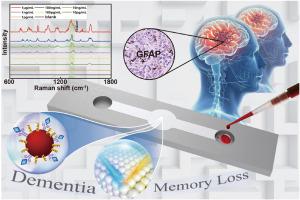当前位置:
X-MOL 学术
›
Anal. Chim. Acta
›
论文详情
Our official English website, www.x-mol.net, welcomes your feedback! (Note: you will need to create a separate account there.)
A SERS nanocellulose-paper-based analytical device for ultrasensitive detection of Alzheimer's disease
Analytica Chimica Acta ( IF 6.2 ) Pub Date : 2024-03-04 , DOI: 10.1016/j.aca.2024.342447 Wenwen Yuan , Hang Yuan , Ruibing Li , Ruiqi Yong , Ivona Mitrovic , Eng Gee Lim , Sixuan Duan , Pengfei Song
Analytica Chimica Acta ( IF 6.2 ) Pub Date : 2024-03-04 , DOI: 10.1016/j.aca.2024.342447 Wenwen Yuan , Hang Yuan , Ruibing Li , Ruiqi Yong , Ivona Mitrovic , Eng Gee Lim , Sixuan Duan , Pengfei Song

|
Alzheimer's disease (AD), one of the most prevalent neurodegenerative diseases, results in severe cognitive decline and irreversible memory loss. Early detection of AD is significant to patients for personalized intervention since effective cure and treatment methods for AD are still lacking. Despite the severity of the disease, existing highly sensitive AD detection methods, including neuroimaging and brain deposit-positive lesion tests, are not suitable for screening purposes due to their high cost and complicated operation. Therefore, these methods are unsuitable for early detection, especially in low-resource settings. Although regular paper-based microfluidics are cost-efficient for AD detection, they are restricted by a poor limit of detection (LOD). To address the above limitations, we report the ultrasensitive and low-cost nanocellulose paper (nanopaper)-based analytical microfluidic devices (NanoPADs) for detecting one of the promising AD blood biomarkers (glial fibrillary acidic protein, GFAP) using Surface-enhanced Raman scattering (SERS) immunoassay. Nanopaper offers advantages as a SERS substrate, such as an ultrasmooth surface, high optical transparency, and tunable chemical properties. We detected the target GFAP in artificial serum, achieving a LOD of 150 fg mL. The developed NanoPADs are distinguished by their cost-efficiency and ease of implementation, presenting a promising avenue for effective early detection of AD's GFAP biomarker with ultrahigh sensitivity. More importantly, our work provides the experimental routes for SERS-based immunoassay of biomarkers on NanoPADs for various diseases in the future.
中文翻译:

基于 SERS 纳米纤维素纸的分析装置,用于超灵敏检测阿尔茨海默病
阿尔茨海默病(AD)是最常见的神经退行性疾病之一,会导致严重的认知能力下降和不可逆转的记忆丧失。由于AD目前仍缺乏有效的治愈和治疗方法,因此早期发现AD对于患者进行个性化干预具有重要意义。尽管疾病很严重,但现有的高灵敏度AD检测方法,包括神经影像学和脑沉积物阳性病变检测,由于成本高且操作复杂,不适合筛查目的。因此,这些方法不适合早期检测,特别是在资源匮乏的环境中。尽管常规纸基微流控技术对于 AD 检测具有成本效益,但它们受到检测限 (LOD) 较差的限制。为了解决上述限制,我们报告了基于超灵敏且低成本的纳米纤维素纸(纳米纸)的分析微流体装置(NanoPAD),用于使用表面增强拉曼散射检测一种有前途的 AD 血液生物标志物(胶质纤维酸性蛋白,GFAP) (SERS) 免疫分析。纳米纸作为 SERS 基底具有多种优点,例如超光滑的表面、高光学透明度和可调节的化学性质。我们在人工血清中检测到目标 GFAP,LOD 达到 150 fg mL。所开发的 NanoPAD 以其成本效益和易于实施而著称,为有效早期检测具有超高灵敏度的 AD GFAP 生物标志物提供了一条有前途的途径。更重要的是,我们的工作为未来基于SERS的NanoPADs生物标志物免疫分析多种疾病提供了实验途径。
更新日期:2024-03-04
中文翻译:

基于 SERS 纳米纤维素纸的分析装置,用于超灵敏检测阿尔茨海默病
阿尔茨海默病(AD)是最常见的神经退行性疾病之一,会导致严重的认知能力下降和不可逆转的记忆丧失。由于AD目前仍缺乏有效的治愈和治疗方法,因此早期发现AD对于患者进行个性化干预具有重要意义。尽管疾病很严重,但现有的高灵敏度AD检测方法,包括神经影像学和脑沉积物阳性病变检测,由于成本高且操作复杂,不适合筛查目的。因此,这些方法不适合早期检测,特别是在资源匮乏的环境中。尽管常规纸基微流控技术对于 AD 检测具有成本效益,但它们受到检测限 (LOD) 较差的限制。为了解决上述限制,我们报告了基于超灵敏且低成本的纳米纤维素纸(纳米纸)的分析微流体装置(NanoPAD),用于使用表面增强拉曼散射检测一种有前途的 AD 血液生物标志物(胶质纤维酸性蛋白,GFAP) (SERS) 免疫分析。纳米纸作为 SERS 基底具有多种优点,例如超光滑的表面、高光学透明度和可调节的化学性质。我们在人工血清中检测到目标 GFAP,LOD 达到 150 fg mL。所开发的 NanoPAD 以其成本效益和易于实施而著称,为有效早期检测具有超高灵敏度的 AD GFAP 生物标志物提供了一条有前途的途径。更重要的是,我们的工作为未来基于SERS的NanoPADs生物标志物免疫分析多种疾病提供了实验途径。



























 京公网安备 11010802027423号
京公网安备 11010802027423号